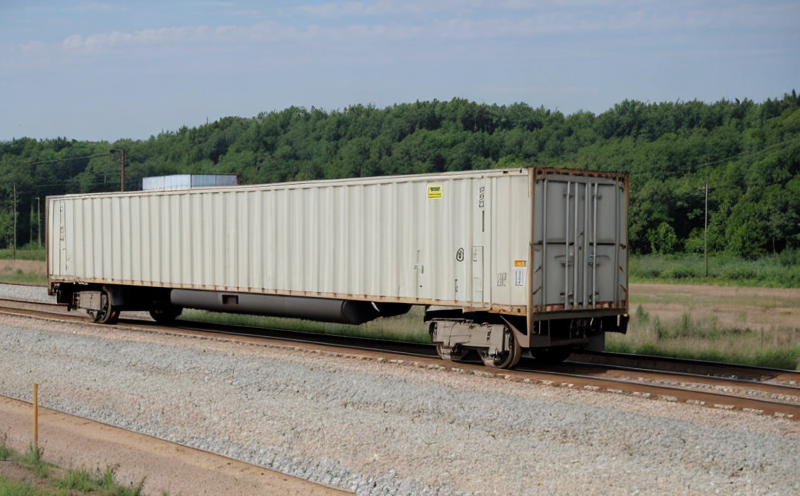EN 12663 Floor Strength Testing for Cargo Loads
In the railway and transportation sector, ensuring the integrity of cargo-carrying vehicles is critical to prevent accidents and damage to goods. The European standard EN 12663:2008 provides a framework for testing the floor strength of freight wagons, ensuring they can safely support heavy loads without compromising structural integrity or passenger safety.
This service involves subjecting a cargo-wagon floor to simulated loading conditions that mimic real-world scenarios. The primary goal is to determine whether the floor can withstand specified cargo loads without any permanent deformation or failure. The test setup typically includes a rigid metal plate, which simulates the load-bearing surface of a wagon's floor.
The procedure begins by placing the metal plate on the wagon’s floor, followed by progressively loading it with weights until either the maximum allowed load is reached (without failure) or structural damage occurs (indicating failure). The testing apparatus used for this service includes a load frame capable of applying precise and controlled forces to the test specimen. Compliance officers, quality managers, R&D engineers, and procurement professionals can benefit from this testing as it ensures that cargo wagons meet safety standards.
The standard specifies detailed procedures for performing these tests, including environmental considerations such as temperature and humidity control during the test. The acceptance criteria are based on whether or not there is any permanent deformation after loading and unloading the specified weights. This service helps railway operators comply with international regulations while enhancing passenger and cargo safety.
Understanding the parameters of this testing method is essential for those involved in the design, manufacturing, and maintenance of freight wagons. It ensures that these vehicles can safely transport heavy loads without compromising structural integrity or causing any damage during transit. This service not only meets regulatory requirements but also contributes to safer transportation practices.
The following table outlines some key aspects of EN 12663:
| Parameter | Description |
|---|---|
| Test Load | The weight used to simulate the cargo load on the wagon floor. |
| Testing Environment | The conditions under which testing is conducted, including temperature and humidity levels. |
| Acceptance Criteria | The standards for determining whether the test passes or fails based on observed deformations. |
Applied Standards
To ensure consistent and reliable results, EN 12663:2008 is aligned with several international standards:
- ISO 9001: Quality Management Systems - Requirements
- ISO 14001: Environmental Management Systems - Requirements with Guidance for Use
- ISO 45001: Occupational Health and Safety Management Systems - Requirements
These standards provide a robust framework that ensures the integrity of the testing process, helping to meet regulatory requirements while promoting best practices in quality management.
Benefits
The benefits of EN 12663 floor strength testing for cargo loads are multifaceted:
- Safety Assurance: Ensures that freight wagons can safely carry heavy loads without compromising structural integrity or causing accidents.
- Regulatory Compliance: Helps railway operators meet international standards and regulations, reducing the risk of legal penalties.
- Enhanced Reputation: Demonstrates commitment to quality and safety, which enhances an operator's reputation in the industry.
- Cost Efficiency: Prevents costly repairs or replacements by identifying potential issues early in the testing process.
By adhering to this standard, railway operators can ensure that their freight wagons are safe and reliable, thereby protecting both passengers and cargo.
Frequently Asked Questions
Use Cases and Application Examples
Cargo & Freight Wagon Testing plays a crucial role in several scenarios:
- New Product Development: Ensures that newly designed wagons can meet the specified load requirements.
- Maintenance Programs: Identifies potential structural issues early and helps plan maintenance schedules effectively.
- Audits and Inspections: Provides evidence of compliance with standards during regulatory audits or inspections.
- International Shipping: Ensures that cargo wagons meet the safety requirements for international transportation, enhancing global market access.
In these scenarios, EN 12663 floor strength testing is a vital component in maintaining high standards of safety and reliability within the railway and transportation sector.





